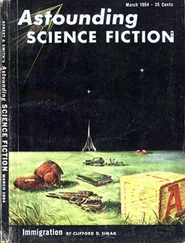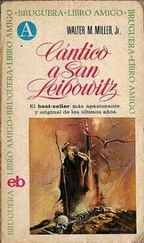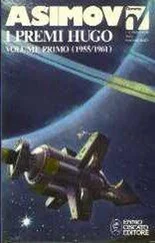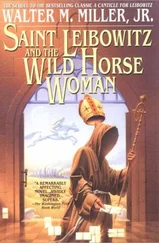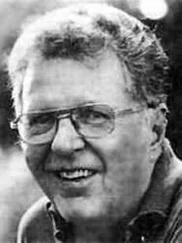“I’ve not offered to change these stones into bread for you yet, have I?” the old traveler said crossly.
Brother Francis glanced up quickly. So! the old man could read, and read Scripture, at that. Furthermore, his remark implied that he had understood both the novice’s impulsive use of holy water and his reason for being here as well. Aware now that the pilgrim was teasing him, Brother Francis lowered his eyes again and waited.
“Hmmm-hnnn! So you’re to be left alone, are you? Well, then, I’d best be on my way. Tell me, will your brothers at the abbey let an old man rest a bit in their shade?”
Brother Francis nodded. “They’ll give you food and water too,” he added softly, in charity.
The pilgrim chuckled. “For that, I’ll find you a rock to fit that gap before I go. God with you.”
But you need not — The protest died unspoken. Brother Francis watched him hobbling slowly away. The pilgrim wandered in and about among the rubble mounds. He paused occasionally to inspect a stone or pry at one with his staff. His search would surely prove fruitless, the novice thought, for it was a repetition of a search which the youth himself had been making since mid-morning. He had decided at last that it would be easier to remove and rebuild a section of the highest tier than to find a keystone that approximated the hourglass shape of the gap in that tier. But, surely, the pilgrim would soon exhaust his patience and wander on his way.
Meanwhile, Brother Francis rested. He prayed for the recovery of that inward privacy which the purpose of his vigil demanded that he seek: a clean parchment of the spirit whereon the words of a summons might be written in his solitude — if that other Immensurable Loneliness which was God stretched forth Its hand to touch his own tiny human loneliness and to mark his vocation there. The Little Book, which Prior Cheroki had left with him on the preceding Sunday, served as a guide to his meditation. It was centuries old, and it was called Libellus Leibowitz, although only an uncertain tradition attributed its authorship to the Beatus himself.
“Parum equidem te diligebam, Domine, juventute mea; quare doleo nimis… Too little, O Lord, did I love Thee in the time of my youth; wherefore I grieve exceedingly in the time of my age. In vain did I flee from Thee in those days…”
“Hoy! Over here!” came a shout from beyond the rubble mounds.
Brother Francis glanced up briefly, but the pilgrim was not in sight. His eyes fell again to the page.
“Repugnans tibi, ausus sum quaerere quid, quid doctius mihi fide, certius spe, aut dulcius caritate visum esset. Quis itaque stultior me…”
“Hey boy!” the cry came again. “I found you a stone, one likely to fit.”
This time when Brother Francis looked up, he caught a glimpse of the pilgrim’s staff waving signals to him beyond the top of a rubble heap. Sighing the novice returned to his reading.
“O inscrutabilis Scrutater animarum, cui patet omne cor, si me vocaveras, olim a te fugeram. Si autem nunc velis vocare me indignum…”
And, irritably from beyond the rubble mound: “All right, then, suit yourself. I’ll mark the rock and set a stake by it. Try it or not, as you please.”
“Thank you,” the novice sighed, but doubted that the old man heard him. He toiled on with the text:
“Libera me, Domine, ab vitiis meis, ut solius tuae voluntatis mihi cupidus sim, et vocationis…”
“There, then!” the pilgrim shouted. “It’s staked and marked. And may you find your voice soon, boy. Olla allay!”
Soon after the last shout faded and died, Brother Francis caught a glimpse of the pilgrim trudging away on the trail that led toward the abbey. The novice whispered a swift blessing after him, and a prayer for safe wayfaring.
His privacy having been restored, Brother Francis returned the book to his burrow and resumed his haphazard stonemasonry, not yet troubling himself to investigate the pilgrim’s find. While his starved body heaved, strained, and staggered under the weight of the rocks, his mind, machinelike kept repeating the prayer for the certainty of his vocation:
“Libere me, Domine, ab vitiis meis… Set me free, O Lord, from my own vices, so that in my own heart I may be desirous of only Thy will, and be aware of Thy summons if it come… ut solius tuae voluntatis mihi cupidus sim, et vocatinonis tuae conscius si digneris me vocare. Amen.
“Set me free, O Lord, from my own vices, so that in my own heart…”
A sky-herd of cumulus clouds, on their way to bestow moist blessings on the mountains after cruelly deceiving the parched desert, began blotting out the sun and trailing dark shadow-shapes across the blistered land below, offering intermittent but welcome respite from the searing sunlight. When a racing cloud-shadow wiped its way over the ruins, the novice worked rapidly until the shadow was gone, then rested until the next bundle of fleece blotted out the sun.
It was quite by accident that Brother Francis finally discovered the pilgrim’s stone. While wandering thereabouts, he stumbled over the stake which the old man had driven into the ground as a marker. He found himself on his hands and knees staring at a pair of marks freshly chalked on an ancient stone:
The marks were so carefully drawn that Brother Francis immediately assumed them to be symbols, but minutes of musing over them left him still bemused. Witch markings perhaps? But no, the old man had called: “God-with-you,” as a witch would not. The novice pried the stone free from the rubble and rolled it over. As he did so, the rock mound rumbled faintly from within; a small stone clattered down the slope. Francis danced away from a possible avalanche, but the disturbance was momentary. In the place where the pilgrim’s rock had been wedged, however, there now appeared a small black hole.
Holes were often inhabited.
But this hole seemed to have been so tightly corked by the pilgrim’s stone that scarcely a flea could have entered it before Francis had overturned the rock. Nevertheless, he found a stick and gingerly thrust it into the opening. The stick encountered no resistance. When he released it, the stick slid into the hole and vanished, as if into a larger underground cavity. He waited nervously. Nothing slithered forth.
He sank to his knees again and cautiously sniffed at the hole. Having noticed neither an animal odor nor any hint of brimstone, he rolled a bit of gravel into it and leaned closer to listen. The gravel bounced once, a few feet below the opening, and then kept rattling its way downward, struck something metallic in passing, and finally came to rest somewhere far below. Echoes suggested an underground opening the size of a room.
Brother Francis climbed unsteadily to his feet and looked around. He seemed alone, as usual, except for his companion buzzard which, soaring on high, had been watching him with such interest lately that other buzzards occasionally left their territories near the horizons and came to investigate.
The novice circled the rubble heap, but found no sign of a second hole. He climbed an adjacent heap and squinted down the trail. The pilgrim had long since vanished. Nothing moved along the old roadway, but he caught a fleeting glimpse of Brother Alfred crossing a low hill a mile to the east in search of firewood near his own Lenten hermitage. Brother Alfred was deaf as a post. There was no one else in view. Francis foresaw no reason whatever to scream for help, but to estimate in advance the probable results of such a scream, if the need should arise, seemed only an exercise of prudence. After a careful scrutiny of the terrain, he climbed down from the mound. Breath needed for screaming would be better used for running.
Читать дальше

